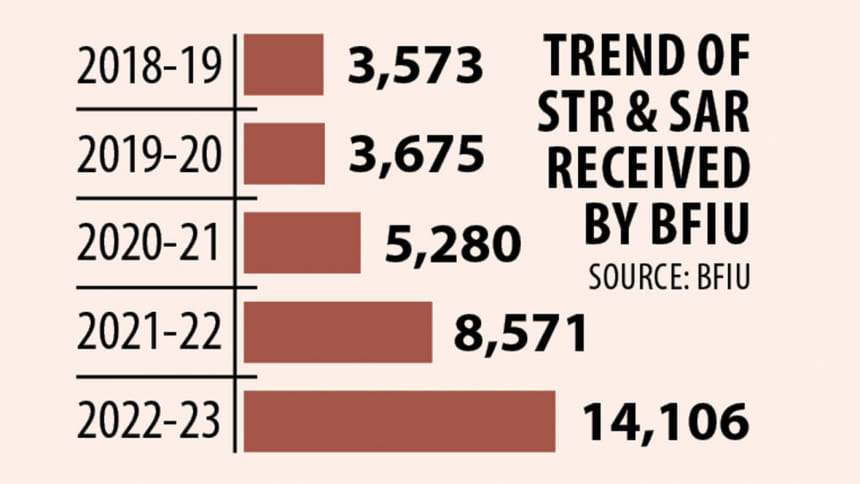BFIU Annual Report: Suspicious transaction, activity reports up 65pc

There were 14,106 reports of suspicious financial activities and transactions in the 2022-23 fiscal year, a 65 percent rise from the previous year, according to Bangladesh Financial Intelligence Unit.
The anti-money laundering agency received the reports from banks, non-bank financial institutions, capital market intermediaries, remitters, and other sources.
Of the total, 9,769 are suspicious transaction reports (STR) and 4,337 are suspicious activity reports (SAR), says the annual report of Bangladesh Financial Intelligence Unit (BFIU) released yesterday.
Addressing a press conference at Bangladesh Bank office, BFIU chief Masud Biswas said the number of reports increased because of awareness and improvement of skills of officials at the reporting agencies, the changing nature of crime, and the BFIU's strong position to combat money laundering and financing of terrorism.
Preventive measures are important in curbing money laundering because it is very difficult to bring back laundered money, he added.
"We recommended that the government enter the Mutual Legal Assistance Agreements with Canada, the US, the UK and seven other countries to bring back laundered money," he said.
The government is working on it, he said.
In the last fiscal year, 91 percent of the incidents were reported by banks and 6.38 percent by money remitters, says the annual report.
From July 2018 to June 2023, the BFIU received 1,112 STRs and SARs related to loans. The number of such reports increased sharply in the last two years.
There were 520 reports regarding loans in the 2022-23 fiscal year, 341 in 2021-22, 94 in 2019-20, and 59 in 2018-19.
These reports have become frequent because of issues with repayment or source of repayment funds, loans obtained through fraudulence, deliberate default on loan repayment, and fund diversions.
The BFIU sent 133 financial intelligence reports to the Criminal Investigation Department, Anti-Corruption Commission, National Board of Revenue and other agencies.
Capital account is not convertible in our country, but the current account is only convertible and around 85 percent of the money laundering is conducted through export and import business, said the BFIU chief.
Trade-based money laundering is not being reduced substantially because banks are reluctant to check the pricing anomalies.
The central bank monitoring has somewhat reduced trade-based money laundering recently, he added.
Asked how a former minister acquired significant assets abroad bypassing the anti-money laundering agency, he said, "We filed cases through the Anti-Corruption Commission against some individuals who syphoned money off and the process of collecting information about some people from different countries is going on."
The people laundering money do not use the banking channel directly because capital account is not convertible, he added
The anti-money laundering agency has so far only brought back the money laundered by BNP Chairperson Khaleda Zia's younger son Arafat Rahman Koko.

 For all latest news, follow The Daily Star's Google News channel.
For all latest news, follow The Daily Star's Google News channel. 



Comments